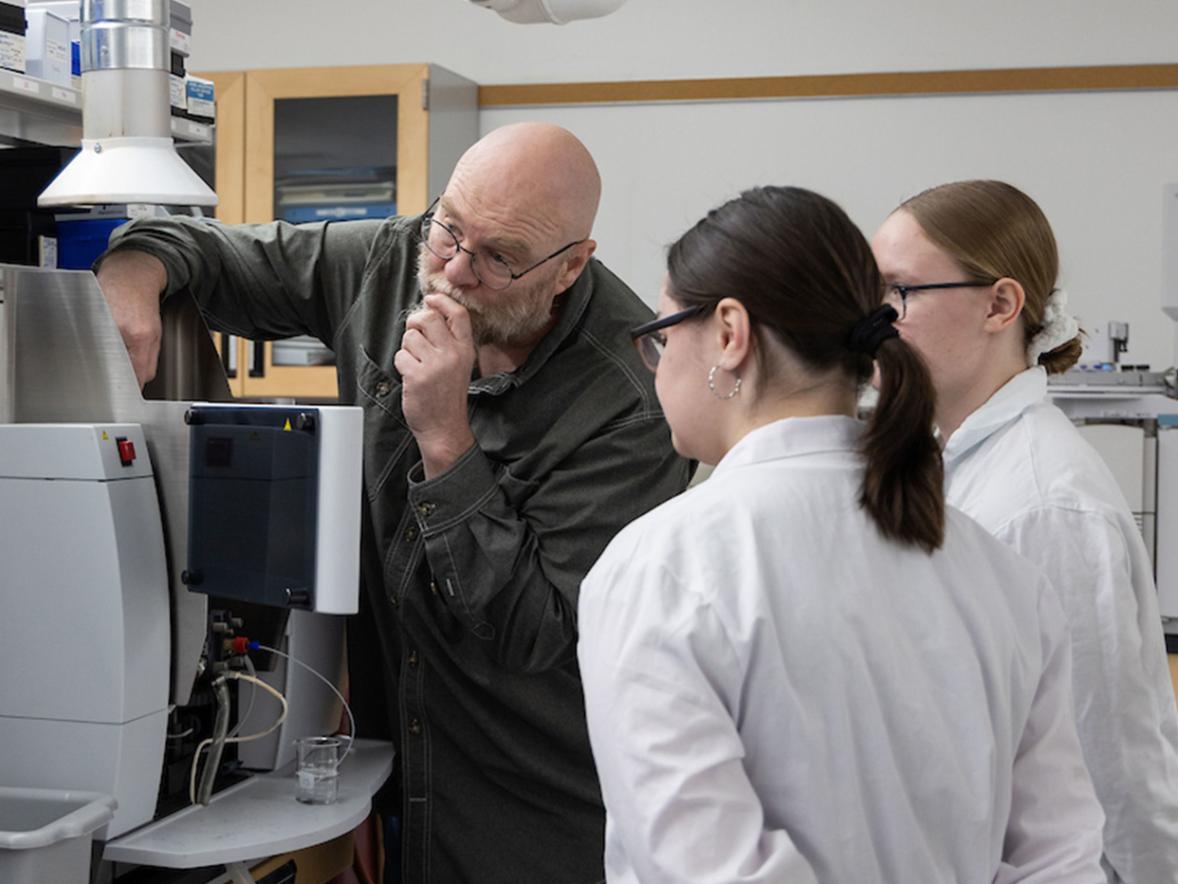The U.S. Centers for Disease Control and Prevention estimates that 48 million people per year contract a foodborne illness, such as salmonella and E. coli.
To help identify and prevent biological, chemical and physical hazards in food, UW-Stout master's in food science and technology student Srihaasa Vempatapu and FST undergraduate senior Lainie Carlson researched Hazard Analysis and Critical Control Point – a food safety measurement system used in every stage of the production process.
With forty-two of their food science peers in Professor Taejo Kim’s Food Quality class, they researched HACCP for dairy, juice, meat, poultry, seafood and low-acid canned foods, conducting hands-on testing of foods in the labs.
“HACCP covers the entire food system from growing and harvesting to processing, manufacturing, distributing, merchandising and consumption to reduce the risk of foodborne illness,” said Kim, whose goal is to train students to be qualified quality assurance personnel.
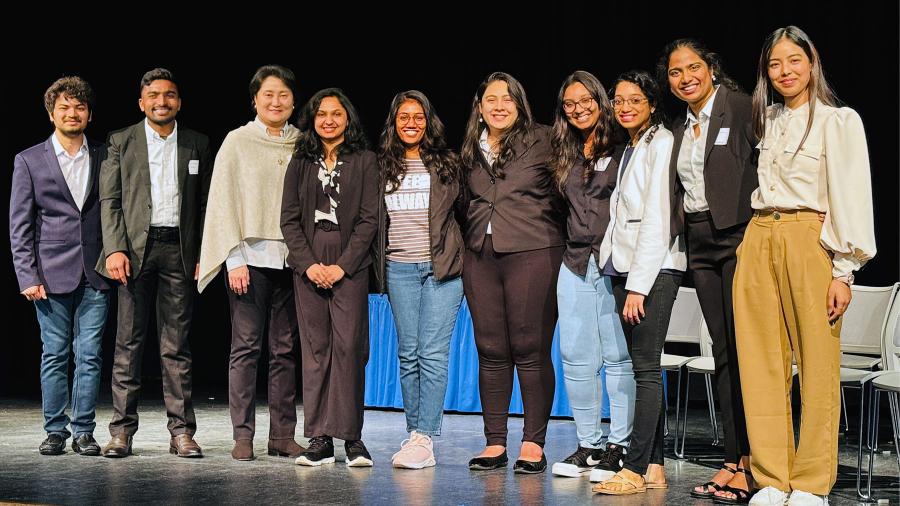
Students presented their HACCP plans and other research at UW-Stout’s annual Research Day, an event showcasing student, faculty and staff research, creativity, and innovation and its impact. Several were awarded for their efforts in the field.
The concept of HACCP was first developed in the 1960s by NASA to assess and implement food safety requirements for the space program. It was presented to the food industry in 1971 through the National Conference on Food Protection.
Vempatapu, of India, thinks HACCP is important because it systematically discovers, assesses and manages possible hazards that could jeopardize food safety.
“HACCP assists in preventing contamination, microbial development and other hazards that could result in foodborne illnesses by concentrating on crucial control points throughout the production process,” she said. “Public health and consumer confidence in the food supply chain are protected by this methodical approach, which also improves quality control and regulatory compliance and guarantees the safety of food items.”
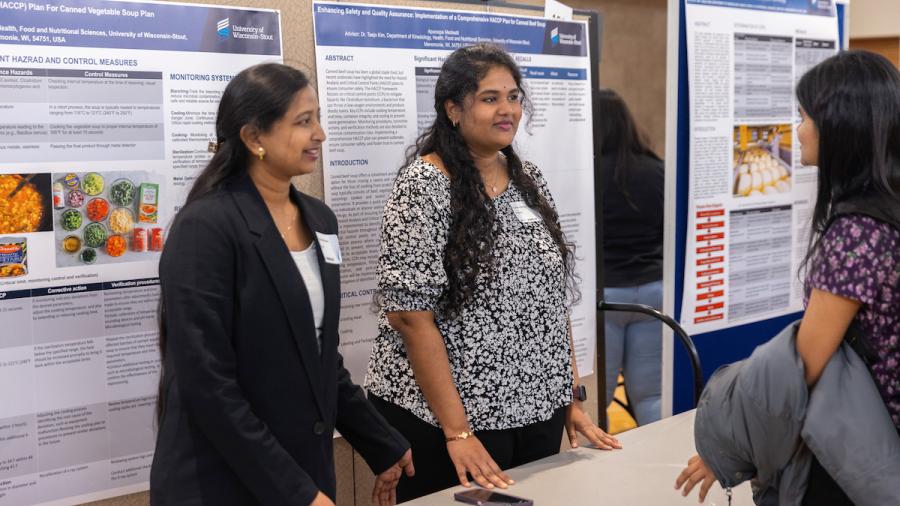
Carlson, of Elk River, Minn., believes that the basic consumer does not know how many steps are taken to ensure safety in their food.
“They just have faith in the manufacturers. HACCP is the reason for that faith. I learned a lot more about the food industry and how important it is to keep food safe,” she said.
Students learned the significance of HACCP's seven principles and applications, which include conducting a hazard analysis, determining the critical control points and establishing critical limits, monitoring procedures, corrective actions, verification procedures, and record-keeping and documentation procedures.
In the U.S., the principles are managed by the National Advisory Committee on Microbiological Criteria for Foods, chartered under the U.S. Department of Agriculture. They are universally accepted by government agencies, trade associations and food industries around the world, such as the U.S. Food and Drug Administration, the European Union's Food Safety Authority and the International HACCP Alliance.
To become certified, individuals must successfully pass a third-party certification audit, provided by a qualified food safety auditor. Businesses achieve accreditation, verified by a qualified auditor, by conducting a hazard analysis, establishing critical control points and implementing procedures to control those hazards.
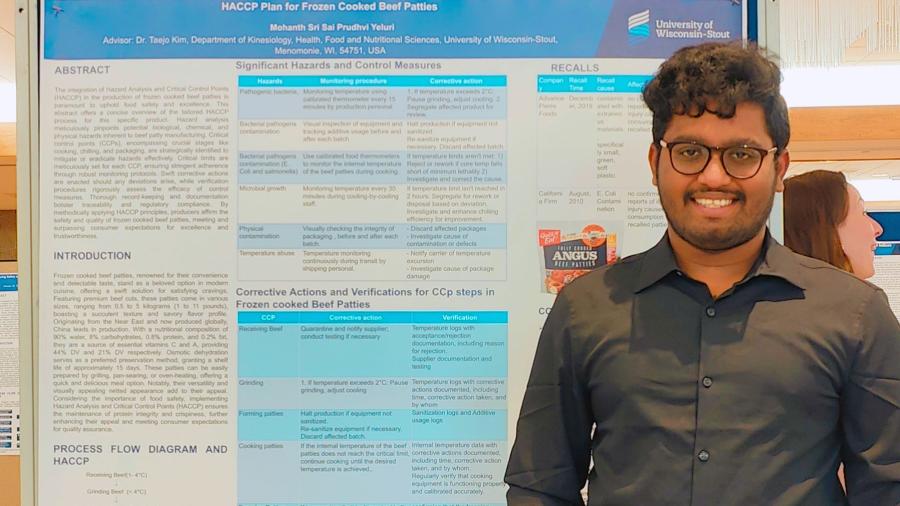
Research Day is an ‘opportunity to showcase their talent’
During Research Day, Vempatapu gave an oral presentation on “HACCP on Low Fat Mayonnaise,” which entails locating possible risks, such as microbiological contamination, insufficient pasteurization or ingredient spoiling.
“In order to reduce these hazards, critical control points are implemented, such as temperature control during production and hygienic packing,” she said. “The safety and quality of the low-fat mayonnaise are guaranteed by routine monitoring and documentation, which guarantees that safety precautions are continuously followed throughout production.”
Carlson designed an “HACCP Plan for Raw Milk Cheese” – cheese made from unpasteurized milk.
“Through many different databases, I found how raw milk cheese has six critical control points: receiving raw milk, storage of raw milk, salting of the cheese, fermentation, metal detection, storage and distribution,” she said.
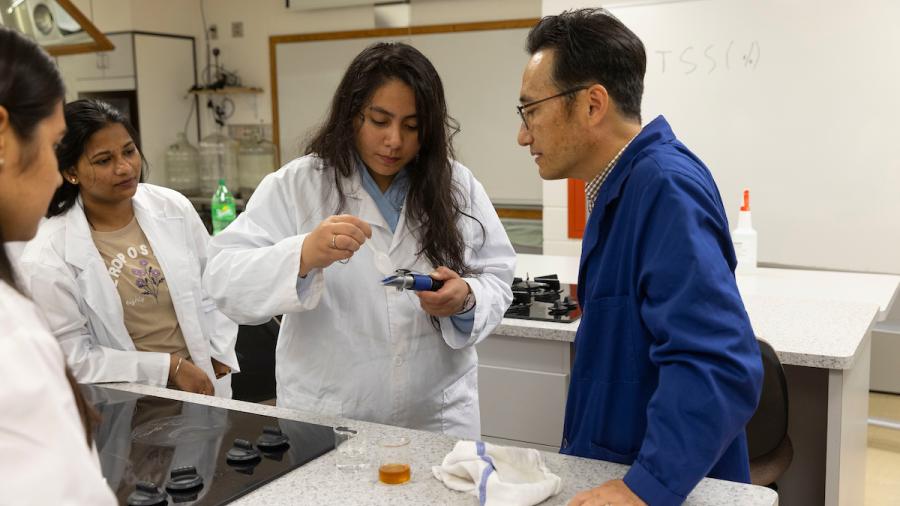
Carlson enjoyed researching regulations, including how raw milk cheese has to be fermented for at least 60 days before it can be sold, so soft cheeses cannot be made with raw milk, she explained.
Vempatapu and Carlson think Research Day is a valuable opportunity for students to showcase their talent and efforts, and where they can share their projects with others to show the impact food science has on the food industry.
They feel that their research has given them valuable insights on HACCP and has helped prepare them for their post-graduation goals.
“The labs at Stout have shown to be beneficial in my hands-on learning,” Vempatapu said. “They offer chances to put theoretical knowledge into practice, carry out investigations, collect data and hone the kind of practical abilities that are necessary for research in a variety of fields.
“Engaging in experiential education can promote a more profound comprehension of ideas and approaches, equipping researchers to effectively tackle problems in the real world.”
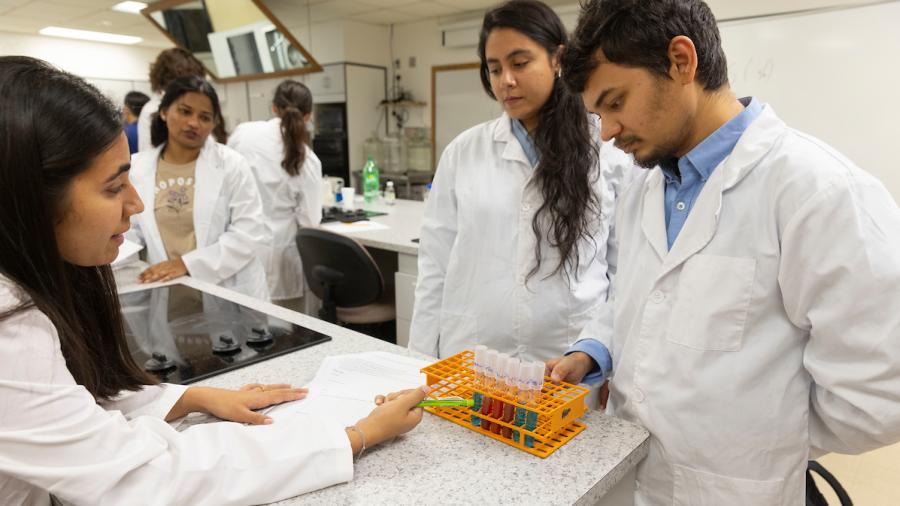
Award-winning research in food science
Shuyi Zhou, a second-year student who plans to go on to graduate school, enjoys analyzing the hazards of biological chemicals and physical problems in food and beverage products.
At Research Day, she presented her poster “Hazard Analysis Critical Control Point Process Development for Ready-to-Eat Spiced Ham.”
“I think any food product without HACCP is not a safe product. The HACCP of food products is like the birth certificate of a baby,” she explained, meaning the plan affirms that a product is ready for shelf-life and consumption.
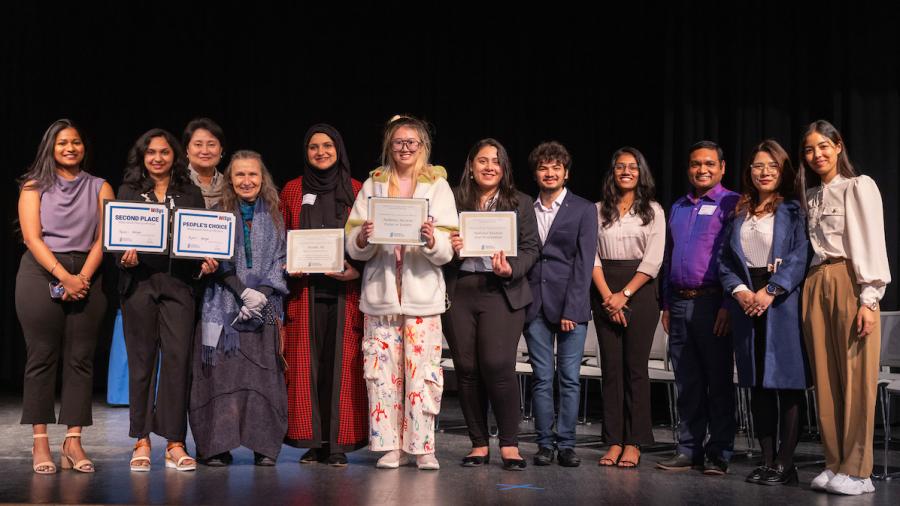
Zhou, of China, won first place for her poster presentation at Research Day, and four graduate students were awarded for their contributions to food science:
- Priyanka Shah and Vraj Shah won first place for their oral presentation on the “Effect of Chickpea and Sweet Pea Milk on the Physicochemical, Textural and Sensory Properties of Sugar-Free Vegan Ice Cream”
- Tejasri Vanga won second place at the WiSys Quick Pitch held during Research Day, as well as Audience Favorite, for her presentation on “Comparative Study on the Properties of Various Thickeners for Producing Plant-Based Meat Analogs”
- Areeba Ali received an Outstanding Graduate Researcher honorable mention.
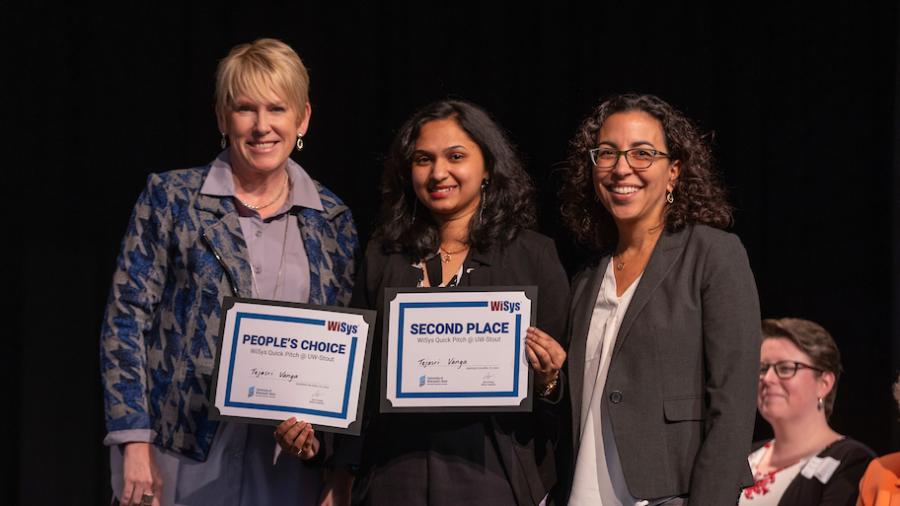
Priyanka and Vraj, with mentor Professor Pranabendu Mitra, aimed to develop a sugar-free, lactose-free dessert using unconventional milk, fat and sweetener to achieve a vegan ice cream with similar texture and taste of dairy-based ice cream.
“Stout has been a key component of our success, providing us all the technical assistance and unwavering support of our mentors for bringing our ideas into reality in the food science labs,” they said.
Vanga conducted research to identify the physiochemical properties of thickeners, like methylcellulose, gellan gum and citrus pectin, which play an important role in the texturization of alternate muscle fibers, or plant-based meat analogs, she said.
PBMAs offer vegetarian options that simulate meat-like flavors and are designed to improve the nutritional functionality of the product.
“The comparison and evaluation of thickeners can provide a clear understanding of their water-holding capacity, solubility, viscosity and particle size analysis,” said Vanga, whose mentor was Program Director Eun Joo Lee.
Vanga, Priyanka and Vraj, of India, will graduate in December. They plan to pursue careers in research and development.
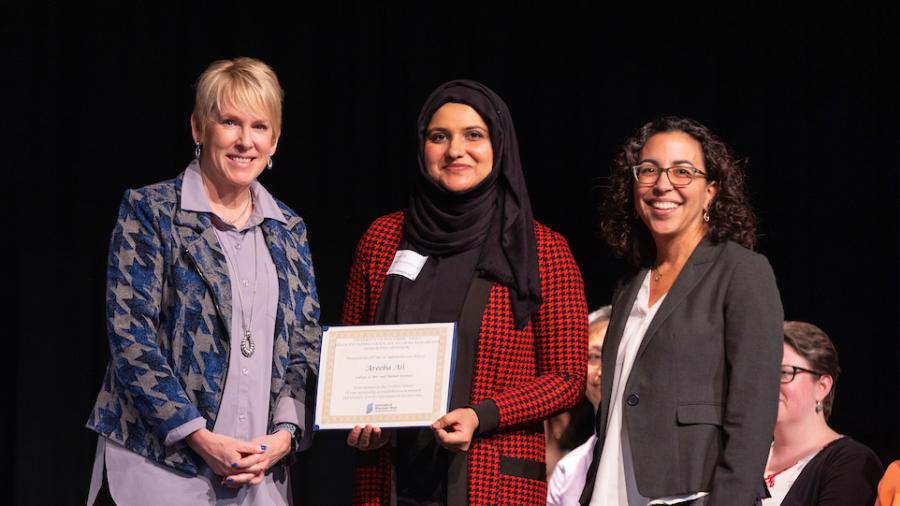
Ali, of Eau Claire, was the lead presenter for the poster titled the “Effect of Strawberry Powder on Physiochemical, Textural and Sensory Properties of No-Added Sugar Chewing Gum.” It was co-authored with Akshar Sunilbhai Patel, Prudhvi Sureddi and Manikanta Yadlapalli, of India. They were awarded a Student Research Grant through the Office of Research and Sponsored Programs.
“The objective of this study was to investigate the effect of strawberry powder on sugar-free gums to meet consumers’ demand for gum-like products. The findings of this research would be helpful in improving gum products, which are essential for the satiety of consumers such as people with diabetes,” Ali said. “It was a good learning experience in the food science labs for conducting our textural analysis and physiochemical studies of our product.”
Ali graduated in May and plans to earn her Ph.D. in food science and technology.
“My future research will be based on the research projects and scholarly activities conducted at UW-Stout. Each project and activity have shaped my aspirations and commitment to make impactful contributions towards the advancement of science,” she said, citing her project in the development of biodegradable, fully sustainable food and beverage packaging materials, as well as innovative and health-conscious food options for people with diabetes and those who are obese.”
UW-Stout’s food science and technology programs are offered through the kinesiology, health, food and nutritional sciences department. The department also offers a bachelor’s in health, wellness and fitness; as well as a bachelor’s in dietetics and a master’s in nutrition and dietetics.






